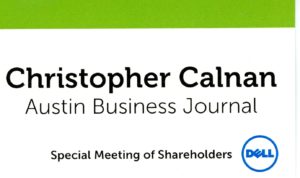 BOSTON — You can’t engineer the truth. But you can buy it.
BOSTON — You can’t engineer the truth. But you can buy it.
Bloomberg News reporter Shahien Nasiripour was removed from his banking beat earlier this year after Wells Fargo CEO Timothy Sloan complained to editors. Nasiripour, a 14-year reporter, was transferred to cover the Trump organization after he had a heated argument with a Wells Fargo public relations person, CNN reported Aug. 27.
Of course, it would be easy for anyone to jump to conclusions and demonize Bloomberg editors for enabling corporate censorship. But that would be too easy. It’d also be unfair because there could be extenuating circumstances and other factors that haven’t been revealed to the public.
However, it’s crucial to note that in March Nasiripour reported this story about Wells Fargo financing the National Rifle Association and the gun industry, which has come under scrutiny after a several mass shootings. It wasn’t a flattering look for Wells Fargo, a company that since 2016 has taken its lumps for a string of widely reported scandals starting with the discovery that workers created fake accounts for customers to meet sales goals.
It’s not unusual for a beat reporter to have a contentious relationship with one of its subjects. Yet it’s totally out of the ordinary for a CEO to intervene in such battles. Wells Fargo is a major customer of Bloomberg’s sister company that sells terminals providing financial data. It’s unlikely Sloan called Bloomberg just to register a complaint; any senior executive could have done that. CEOs call when they want heads to roll. Or in this case, chill enterprise reporting.
Details of Wells Fargo’s influence came just days after more than 300 U.S. news organizations ran editorials supporting reporting freedom. “The press is necessary to a free society because it does not implicitly trust leaders — from the local planning board to the White House,” the Boston Globe wrote Aug. 15.
Those leaders include CEOs who naturally don’t like watchdog reporters. They want lapdogs, pawns. Sloan is probably no exception and he’s justifiably sensitive about bad press. But blaming a reporter for an unflattering story is like blaming a mirror for a bad haircut. It’s nonsensical.
A Bloomberg spokesperson explained the changing of its Wells Fargo reporter by saying: “We make decisions about how we cover those companies based purely on what is best for our readers.” If that’s true, why did Bloomberg determine Nasiripour’s suitability after Sloan’s complaint and not before?
In April, I recounted in this blog post the details of a flagrant case of corporate censorship in Austin, Texas. In mid-2015, an Austin Business Journal manager said that while I was on vacation, Dell Technologies Inc. threatened our parent company, North Carolina-based American City Business Journals, over our coverage. ACBJ execs buckled under the pressure. Tweets were deleted, a story disappeared, media credentials denied by Dell and the reporter who wrote hundreds of unvarnished stories about the company was suddenly given an unscheduled performance review stating that his job was in jeopardy despite the lack of a single human resources issue during 10 years with the company. It was blatant censorship by a bully billionaire in collusion with a national media company.
 Dell Technologies had successfully targeted a reporter who had written hundreds of articles about the company and knew it well. (More than 700 stories listed under this reporter’s byline referenced Dell). Dell public relations people routinely made it clear they didn’t appreciate enterprise stories. One PR guy emailed that such stories would make it more difficult for the ABJ to access Dell execs in the future.
Dell Technologies had successfully targeted a reporter who had written hundreds of articles about the company and knew it well. (More than 700 stories listed under this reporter’s byline referenced Dell). Dell public relations people routinely made it clear they didn’t appreciate enterprise stories. One PR guy emailed that such stories would make it more difficult for the ABJ to access Dell execs in the future.
“There are some things worth risking everything for,” President Obama recently said when eulogizing Arizona Sen. John McCain.
However distasteful Dell’s pressure on the ABJ was, it’s important to know that it was also illegal. In Texas, there’s a tortious interference law designed to discourage such abuse of power.
A 2012 Fourth Court of Appeals (in San Antonio) ruling on a case called Strickland suggests that the Dell executive who called the ABJ’s parent company didn’t have to make an expressed demand that a reporter was fired. Just the call itself can be considered an act of interference, according to the ruling. “A defendant’s interfering conduct need only be a proximate cause of the harm to plaintiff for there to be liability.”
There’s a clear difference between poor newsroom judgment and outright corruption. The damage media execs do to journalism at large with shortsighted decisions can be incalculable.
During McCain’s eulogy, Obama also said something about the former prisoner of war that news execs — all journalists — should heed when dealing with people of power and censorship issues: “In captivity, John learned, in ways that few of us ever will … how each moment, each day, each choice is a test.”

